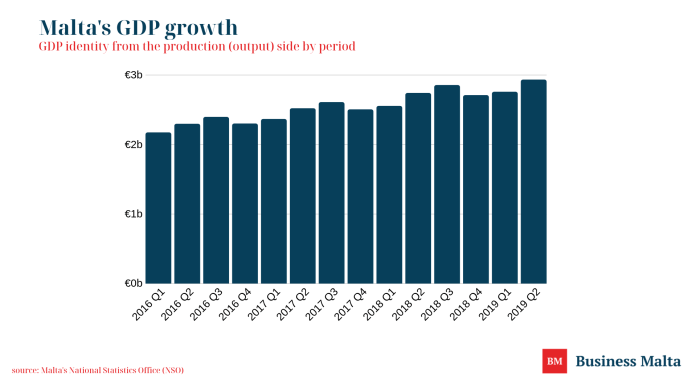
Last Updated on Tuesday, 10 September, 2019 at 12:18 pm by Christian Keszthelyi
Malta’s gross domestic product (GDP) grew by €204m (6.6%) to €3.275b in the second quarter of the year, as compared to the same quarter a year earlier, according to provisional estimates posted by the National Statistics Office (NSO). In volume terms, GDP increased by 4%.
Gross Value Added (GVA) — the net result of output valued at basic prices less intermediate consumption valued at purchasers’ prices — was up by €191.8m in Q2 2019 when compared to the same quarter last year.
The upward trend was boosted by arts, entertainment and recreation, repair of household goods and other services increasing by €40.1m (9.7%); professional, scientific and technical activities, administrative and support service activities increasing by €37.4m (9.4%); and wholesale and retail trade, transportation and storage, accommodation and food service which increasing €32.5m (5.4%).
Considering the effects of income and taxation paid and received by residents to and from the rest of the world, Gross National Income (GNI) — different to GDP measure in terms of net compensation receipts, net property income receivable and net taxes (minus subsidies) receivable on production and imports from abroad — is estimated at €3.001b at market prices for the second quarter of 2019.
Final consumption expenditure increased by 6.5% in nominal terms and 4.8% in volume terms, according to the expenditure approach — a method used for calculating GDP and is derived by adding the consumption of households, government and non-profit institutions serving households, investment and net exports.
Household expenditure was up by 5.4% in nominal terms and 3.8% in volume terms, and government expenditure grew by 9.9% in nominal terms and 7.3% in volume terms; the two segments being the main contributors to the growth, according to NSO figures.
Gross fixed capital formation increased by 3.6% in nominal terms and 0.8% in volume terms, while exports of goods and services increased by 2.3% in nominal terms and decreased by 0.2% in volume terms. Imports of goods and services increased by 0.8% in nominal terms and decreased by 2.3% in volume terms. Recent statistics by another NSO report have shown that Malta’s trade deficit was widening in the first seven months of the year.
The €204m increase in GDP at current prices is estimated to have been distributed into a €69.5m increase in compensation of employees, a €129.9m increase in gross operating surplus and mixed-income and a €4.6m increase in net taxation on production and imports, as compared to the second quarter of the preceding year, according to the income approach — which is used to measure economic activity is the income approach which shows how GDP at market prices is distributed among compensation of employees, operating surplus of enterprises and taxes on production and imports, net of subsidies.
“The coming budget will ensure that this growth is sustained so that it continues to be enjoyed by Maltese and Gozitan families through a higher standard of living and a better quality of life”, said Minister for Finance Edward Scicluna, according to a press statement issued by the Department of Information (DOI) after the NSO figures had been released.
Editorial note: The full publication by NSO is available for download on the official website of the office. The present article has been updated with a quote from the finance minister.





































